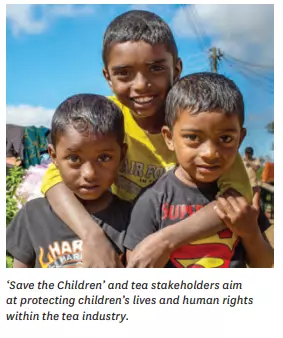Five of Sri Lanka’s top tea companies share the secret to a successful brew .

Sri Lanka is the world’s fourth largest tea producer with the industry employing over one million people in the country. Ceylon Tea is world renowned for its high qual[1]ity and taste. A great cup of Ceylon Tea is made with the contribution of gen[1]erations of people from the plantation communities, especially women, who spend most of their lives in the tea gardens. The protection of human rights within the supply chain, particularly those of children and women, has be[1]come crucial to the industry that relies heavily on a labor intensive workforce.
The country’s leading tea producers have recognized the importance of en[1]suring the social protection of their workforce and sustainability in their business models. These companies un[1]derstand that their labor force live and work in difficult and challenging condi[1]tions. Experiences of intergenerational marginalization and vulnerability re[1]main, to date. These have caused the plantation sector to lag behind progress already achieved in the rural and urban sectors of the country. The Sri Lanka tea industry is challenged by labor retention issues. A happy worker is a productive worker. Happy children mean happy families. Ensuring the wellbeing of chil[1]dren and their families within the tea supply chain therefore, means a more productive workforce and one that is more likely to stay within the industry. As the largest independent interna[1]tional organization working for chil[1]dren, Save the Children proposed the adoption of Child Rights and Business Principles (CRBP) to stakeholders of the local tea industry in 2017. Today, five of Sri Lanka’s largest plantation com[1]panies: Horana Plantations, Kelani Valley Plantations, Talawakelle Tea Estates, Bogawantalawa Tea Estates, and Elpitiya Plantations have inte[1]grated these to their business models.
CRBP is a framework developed by UNICEF and Save the Children is based on the UN Human Rights and Business Principles framework. It is a shared ambition of both Save the Children and tea stakeholders to globally promote ethically produced ‘Ceylon Tea’ bring[1]ing more benefits to both plantation communities and companies by pro[1]moting children’s and human rights within their businesses.
Johann Rodrigo, Chief Executive Officer of Horana Plantations said, “We found that the heart of the planta[1]tions are the mother and then the child, so we have to protect our children because they are the future of the plan[1]tations.”
Rodrigo explained that there had been a gap between children on planta[1]tions, plantation workers and the rest of the population. He stated that there was no functioning mechanism to pro[1]tect children on the estates, which led to his group, Hayleys, embracing the policy across all of their companies.
Adding further, he described the com[1]panies as, “Catalysts between the Gov[1]ernment of Sri Lanka and the plantation community together”
The five companies, facilitated by Save the Children to voluntarily adopt a child protection policy, which upholds the ten child protection standards, signed a public private partnership agreement with the Ministry of Women and Child Affairs in 2019 to work in cooperation ensuring that child protection services delivered by the Government were ac[1]cessible to the children of the estate communities. Under the child protection policy, the companies appointed Child Protection Focal Points for each estate from among the estate staff. There are 134 Children’s Clubs on the estates now, which allow children to participate in decisions on their own development
Village Child Development Committees have meanwhile, been established on 46 of the estates. These map, identify and respond to children’s vulnerabilities. The committees are connected to the Divisional Child Development Committees and are part of the Government’s child protection mechanism. As a result, the estates are now connected with child protection services at the Divisional level through the Child Rights Promotion Officers and Child Protection Officers
Rodrigo also emphasized that the companies were now the main pillars protecting the estate’s children and ensuring them a better life.
For more information on child pro[1]tection in the tea as well as other indus[1]tries, kindly contact Save the Children at gmail.srilanka@savethechildren.org





